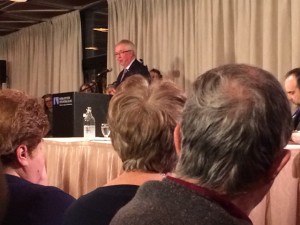Congratulations Liberals, you have once again made things awful for the proper functioning on Canadian democracy, as you so often do. In fact, most of our democratic ills in this country can be traced directly back to Liberal “innovations,” like delegated leadership conventions, which removed caucus accountability of the party leader, to the “supporter class” of leadership selection – removing any and all accountability the leader had – and now you’ve decided to eliminate party memberships to further erode what accountability was left in the party system so that all of the remaining power can be centralised in the leader’s office and Big Data can be used to justify any and all policy decisions rather than allowing them to come from the grassroots. Well done! Oh, but no need to worry – Justin Trudeau totally promised that this wasn’t about centralizing power and taking it away from the grassroots (just the regional power brokers, natch), so no need to worry! Absent from that assurance was anything about accountability, which isn’t surprising given the way the history of these attempts to “democratize” things happen in this country. I’m not saying that the party didn’t need to update its various constitutions into a single body. That’s fine. But memberships are actually an important thing for the role of a political party in our democratic system. And while I get that the “supporter” category during the leadership was instrumental in populating the database that they’re so very proud of for their new digital future, it doesn’t erase the role that grassroots members play. While the Liberals are trying to “deconstruct” what a political party is and turn it into a “movement,” it can’t escape that political parties are not just “private clubs,” as the rhetoric around the new constitution has been trying to paint them as (and indeed, rhetoric used going back to the introduction of the “supporter” category during the leadership). And beyond just offering organizational structure within Parliament (which is in itself a Very Big Deal), parties have an interlocutory role to play between the parliamentary caucus and the public at large. It’s why people are supposed to be joining parties – to provide bottom-up ideas and policies, to nominate candidates, and in return, the riding associations act as interfaces to bring local concerns to caucus if there is no local representative. But we’re not taught about the importance of joining riding associations in school, and when the grassroots has weak structures and little power, then it only empowers the apparatchiks in Ottawa at the centre of the party. I fail to see how Trudeau’s new “movement” is going to empower the grassroots when riding associations will be hollowed out in favour of “streamlining” policy proposals via Big Data. The social and community aspects of riding associations are gone because there is no longer anything there for them to do, other than organise nominations every few years. And not only does it weaken the grassroots, it further diminishes the power of MPs (as Peter Lowen writes here) because that power gets centralized in the leader’s office – just as the power of MPs started being eroded when we took away their ability to select and remove leaders. But because we’re not being taught civic literacy, we’re not learning these lessons, and power continues to be centralized. Trudeau has consolidated a great deal of power now, owing to his popularity, and he is accountable to nobody, and the party structures that would place any kind of check on that power are now gone. I don’t see this as a great day for the Liberal party, but one that harkens worse things to come for our country’s political system as a whole.
https://twitter.com/aaronwherry/status/736672242864656385


